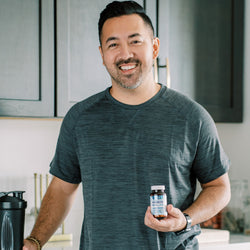
New studies in the science of sleep suggest that the effects of sleep deprivation on your body can be drastic and long-term. From your health and mood to your memory and cognition.
Poor sleep, particularly for prolonged periods of time, can age your brain between 3–5 years! In addition, there is a 33% risk increase for decreased brain function and dementia.
With these concerns and other health effects in mind, we’ve come up with a simplified list of ways you can improve your sleep. It just requires a few small changes to your day-to-day routine.
1. Increase your exposure to natural light during the day
We’ve got two words for you: circadian rhythm. Proper exposure to natural sunlight during the day directly affects the health and efficacy of your sleep cycle. Not only will more natural sunlight improve your daytime energy, but it will supply you with maximum sleep dividends when it’s time to rest your head on the pillow.
So, here are a few suggestions on how to get more rays during your day:
• Take a walk outside during lunch or on a break
• Open your blinds to your workspace and let the rays flood in for a few hours
2. Reduce blue light exposure (via technology) in the evening
This seems to be one of the more difficult steps for many people to take. Probably because we have become so addicted to technology, especially our phones. And watching Netflix or TV in bed is a popular way to wind-down from the day. However, the blue light from technology tricks your body into thinking it’s still daytime and reduces hormones like melatonin, which are needed to help ease your body into sleep. Many studies have shown that putting away your devices a few hours before bed can allow you to fall asleep much quicker.
Here’s a few ways you can reduce your exposure to blue light:
• Switch your devices to dark mode (especially if you use them frequently for work and for fun)
• Do some device-less activity like reading, a crossword, or drawing before bed
• If you read using a Kindle or iPad make sure to check the settings on your model for a “paper white” or “blue shade” setting (Note: each model is different so simple Google search of the model name with “blue light reduction” should help you find the right setting for your device)
3. Reduce caffeine intake later in the day
Coffee, tea, and even exercise supplements contain varying amounts of caffeine for improved focus or performance. But high levels of caffeine can stimulate your nervous system a little too much and can prevent your body from relaxing naturally. Switching to decaf after 3 or 4 pm can do wonders for your sleep, especially if you are very sensitive to caffeine or have had trouble with sleep previously.
4. Take a supplement with melatonin
Supplements with melatonin are nothing new these days and there are a bunch of options out there, but the biggest mistake is taking them when you already can’t sleep. It’s best to take them 2 hours before bed and let them work within your body’s natural sleep cycle. If you’re already having sleep trouble and it’s 2am, melatonin won’t work the way it’s supposed to. It may end up making you feel extremely groggy the next day as a result. Melatonin can also be particularly helpful when traveling or adjusting to a new time zone (when taken properly).
SHOP SLEEP GUMMIES ››
TO SUM IT ALL UP
You need sleep. Your body needs sleep to function and for your overall health and well-being. There’s also a considerable link between adequate sleep and a person’s mental health.
The number of hours a person needs does shift as they age. For instance, babies need between 12-17 hours of sleep within a 24-hour period and that number starts to decrease as a child grows and enters different age ranges. But even the last age group, which is anyone over the age of 18 and upwards to 65 and beyond, needs at least 7 hours of sleep per night. So, try to make sure you’re giving yourself the restful sleep you need and if you’re struggling try some of our tips. Your body and mind will thank you.













The primary ingredients in our Sleep Gummies are l-theanine, melatonin, and chamomile. For an overview of each ingredient and their pro-sleep properties, take a look at our Sleep Gummies page here:
https://www.newagenatural.com/pages/nan-21-003-sleep-gummies
New Age •